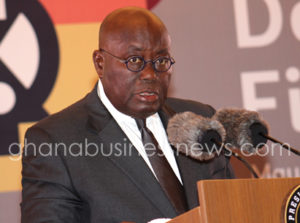Climate Prosperity Plans provide lifelines for nations – Akufo-Addo

President Nana Addo Dankwa Akufo-Addo has urged the Global South community to capitalize on the opportunities available along the Climate Prosperity Plans value chain to boost their economy.
He emphasised that the green transition presented huge opportunities, with a focus on nurturing a future in which prosperity and sustainability coexist.
According to him, the Plans’ objectives “define the lifelines of our nations, designed to channel investments towards sustainable socio-economic development and prosperity”.
President Nana Akufo-Addo was speaking at the Climate Vulnerable Forum (CVF) Leaders’ Investment Roundtable discussion, on the sideline of the World Economic Forum (WEF), in Davos, Switzerland.
The agenda for WEF 2024 is structured around four key themes.
They encompass achieving security and cooperation in a fractured world, creating growth and jobs for a new era, artificial intelligence as a driving force for the economy and society, and a long-term strategy for climate, nature, and energy.
Climate Prosperity Plans (CPPs) constitute comprehensive strategies designed to accelerate the transition to a low-carbon economy, enhance climate resilience and create new economic opportunities for national prosperity.
The Plans involve collaboration between government, private sector, and civil society organisations to develop and implement climate-smart investments and policies that create jobs and improve quality of life for the people while reducing greenhouse gas emissions.
President Nana Akufo-Addo stated that the necessity of the CPP-centred climate action emanated from “the urgency to safeguard the 1.5-degree limit set by the Paris Agreement, which is not merely an environmental imperative, but also an economic necessity for our countries.”
“Overstepping this threshold would exacerbate the fiscal challenges we face, hinder access to capital, and escalate the costs of adaptation, thus, severely undermining our pursuit of prosperity and the achievement of the Sustainable Development Goals (SDGs).”
The President elaborated that “the transformation of the CVF into an independent intergovernmental organisation in December 2023, stands as an important step towards fostering South-South cooperation”.
It is an impetus to unlocking investment opportunities in member states with Climate Prosperity Plans (CPPs) as the blueprint.
With the CVF-V20 Independent Secretariat headquartered in Ghana, the President Akufo-Addo was optimistic this shift, “will allow for a greater influx of international investments into commercially viable and climate-resilient projects within the Global South”.
There is the need for a broad scope of CPP projects, covering areas such as renewable energy, integrated with storage solutions, like solar, offshore wind, geothermal, hydro, along with grid modernisation and micro-grids, and improving energy efficiency in the industrial sector.
Also, attention should be given to broadening and diversifying the supply chain, particularly in manufacturing areas related to transition, critical minerals, and recycling efforts, with all such infrastructure and business ventures required to be adaptable and resilient to change under this scheme.
President Nana Akufo-Addo, citing the innovative Bangladeshi example, said the authorities were able to utilise their CPP to tap into the Resilience and Sustainability Facility of the IMF.
This aided the country in securing $1.4 billion as early-stage financing, thus, strategically being allowed to have a stake in the project and facilitating the leverage of $8 billion.
“Ghana has also presented several renewable energy projects –10,000-megawatt renewable energy project, the Bui Solar project, Microgrids in Off-Grid Communities- enhancing the Adaptive Capacity of the Akosombo Dam and Lower Volta, amongst others,” the President said.
The Climate Vulnerable Forum (CVF) is composed of 68 developing countries most threatened by the global climate emergency, representing 1.74 billion people and $3.8 trillion in Gross Domestic Product.
Source: GNA
